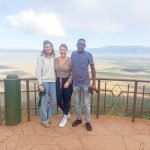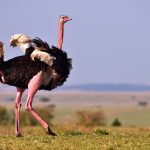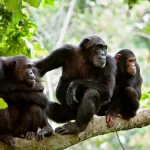
- Tanzania Bird Watching Safaris
-
Written by : Tarimo Expeditions
A Comprehensive Guide to Witnessing the Wonders of Avian Life
Are you an avid bird lover? Do you enjoy exploring new destinations while experiencing the beauty of birdlife? Tanzania, with its diverse ecosystem, offers the perfect destination for birdwatchers to witness the wonder of avian life. In this article, we will take you through the best bird-watching safaris in Tanzania and everything you need to know to plan an unforgettable trip.
Tanzania as a Birdwatching Destination
Tanzania is a country located in East Africa and is known for its diverse wildlife and nature reserves. The country has over 1,000 bird species, making it an excellent destination for birdwatchers. Tanzania’s birdlife is spread throughout its national parks, conservation areas, and forests, making it an ideal place to witness different bird species in their natural habitat.
The Best Time to Go Birdwatching in Tanzania
Tanzania has two main bird-watching seasons. The first season is from October to March, and the second season is from April to September. The best time to go birdwatching in Tanzania is during the first season, as this is when most of the migratory bird species are present.
The Top Bird-Watching Safari Destinations in Tanzania
Tanzania offers various bird-watching destinations that cater to different preferences. Here are the top destinations that you shouldn’t miss on your Tanzania bird-watching safari:
Serengeti National Park
Serengeti National Park is one of the most famous national parks in Tanzania and is known for its vast savannah plains and diverse wildlife. It is also an ideal location for birdwatchers as it has over 500 bird species. The park is home to several bird species that are endemic to Tanzania, such as the Grey-breasted Spurfowl and the Fischer’s Lovebird.
Ngorongoro Conservation Area
The Ngorongoro Conservation Area is a unique destination and a UNESCO World Heritage Site. The area has diverse landscapes, including the Ngorongoro Crater, which is the world’s largest inactive and intact volcanic caldera. It is also home to over 500 bird species, including the African Fish Eagle, the Black Kite, and the Secretarybird.
Lake Manyara National Park
Lake Manyara National Park is situated between the Great Rift Valley and Lake Manyara, and it is famous for its tree-climbing lions. The park also boasts over 400 bird species, including the Flamingo, the Pelican, and the Grey-crowned Crane.
Tarangire National Park
Tarangire National Park is a hidden gem in Tanzania that is often overlooked by tourists. The park has diverse wildlife and is home to over 500 bird species, including the Kori Bustard, the Yellow-collared Lovebird, and the Ashy Starling.
Tanzania’s Birdlife: What to Expect
Tanzania’s birdlife is diverse, and birdwatchers can expect to see various species depending on the destination they choose. Tanzania has bird species that are
endemic to the country, such as the Tanzanian Red-billed Hornbill and the Pemba Sunbird. Birdwatchers can also witness migratory species, such as the European Roller and the White Stork, during the right season.
Tanzania’s birdlife is not limited to a particular habitat or ecosystem. Visitors can witness a wide range of bird species in their natural habitat, including wetlands, forests, savannahs, and mountains.
Bird-Watching Safaris: What to Pack
Bird-watching safaris require different equipment and clothing compared to other types of safaris. Here’s a list of essential items that you should pack for your Tanzania bird-watching safari:
- Binoculars: A good pair of binoculars is essential for birdwatchers. It allows you to observe birds in their natural habitat without disturbing them.
- Field guide: A field guide will help you identify different bird species and learn more about their behavior and habitat.
- Camera: Don’t forget to bring your camera to capture stunning photographs of the birdlife in Tanzania.
- Sunscreen: Tanzania has a tropical climate, and the sun can be harsh. Make sure to bring sunscreen with a high SPF to protect your skin from the sun’s rays.
- Insect repellent: Mosquitoes and other insects can be a nuisance, especially during the rainy season. Make sure to bring insect repellent to protect yourself from insect bites.
- Comfortable clothing and footwear: Tanzania’s climate can be hot and humid, so it’s essential to wear comfortable clothing and footwear suitable for the weather conditions.
- Hat: A hat can protect your face and neck from the sun and keep you cool.
Tips for Bird Watching in Tanzania
Here are some tips to help you make the most of your Tanzania bird-watching safari:
- Hire a knowledgeable guide: A knowledgeable guide can help you identify different bird species and take you to the best locations to witness birdlife.
- Be patient: Bird-watching requires patience as birds can be elusive and difficult to spot. Take your time and observe your surroundings carefully.
- Avoid disturbing the birds: Remember that you’re in their natural habitat, and disturbing them can harm their behavior and ecosystem.
- Respect the park rules: Each national park and conservation area in Tanzania has its rules and regulations. Respect them to ensure the conservation of birdlife and wildlife.
Bird Watching Safaris: Cost and Duration
The cost and duration of a bird-watching safari in Tanzania vary depending on several factors, such as the destination, the tour operator, and the time of the year. On average, a bird-watching safari in Tanzania can cost between $150 and $500 per day, including accommodation, transportation, and park fees. The duration can range from a few days to several weeks, depending on your preference.
How to Choose a Tour Operator for Your Bird-Watching Safari
Choosing the right tour operator is crucial for a successful bird-watching safari in Tanzania. Here are some factors to consider when choosing a tour operator:
- Experience: Look for a tour operator with several years of experience in organizing bird-watching safaris in Tanzania.
- Knowledgeable guides: Make sure that the tour operator provides knowledgeable guides who can help you identify different bird species and take you to the best locations.
- Customization: Choose a tour operator that can customize your bird-watching safari based on your preferences and interests.
- Reputation: Check the tour operator’s reputation by reading reviews and testimonials from previous clients.
Responsible Bird Watching in Tanzania
Responsible bird watching in Tanzania involves following the park rules and regulations, respecting the natural habitat of the birds, and supporting conservation efforts. Here are some ways to practice responsible bird-watching in Tanzania:
- Don’t disturb the birds:
- Keep a safe distance from the birds and avoid making loud noises or sudden movements that can startle them.
- Don’t litter: Dispose of your trash properly and leave the natural environment undisturbed.
- Support conservation efforts: Consider supporting conservation organizations or donating to local conservation initiatives to help protect Tanzania’s birdlife and wildlife.
Tanzania’s birdlife is a treasure trove for birdwatchers around the world. With its diverse range of bird species and stunning natural landscapes, Tanzania offers a unique and unforgettable bird-watching safari experience. By following the tips and guidelines outlined in this article, you can ensure a responsible and enjoyable bird-watching safari in Tanzania.
FAQs
What is the best time to go bird-watching in Tanzania?
The best time to go bird watching in Tanzania is during the dry season from June to October when the weather is pleasant, and the birdlife is abundant.What types of birds can I see in Tanzania?
Tanzania is home to over 1,100 bird species, including endemic species such as the Tanzanian Red-billed Hornbill and the Pemba Sunbird.Do I need a permit to go bird-watching in Tanzania?
Yes, you need a permit to go bird-watching in Tanzania. The permit can be obtained from the Tanzania Wildlife Authority (TAWA).Is it safe to go bird-watching in Tanzania?
Yes, it is safe to go bird-watching in Tanzania. However, it’s essential to follow the park rules and regulations and take necessary precautions to protect yourself from insect bites and sunburn.How much does a bird-watching safari in Tanzania cost?
The cost of a bird-watching safari in Tanzania varies depending on several factors, such as the destination, the tour operator, and the time of the year. On average, a bird-watching safari in Tanzania can cost between $150 and $500 per day.
Best of Our Tanzania Safaris
From the Wildebeest Migration to the Big 5 and Tropical White Sand Beaches
Explore the best of Tanzania with our curated collection of safaris packages. Experience breathtaking wildlife, stunning landscapes and cultural richness, there’s something for everyone.



